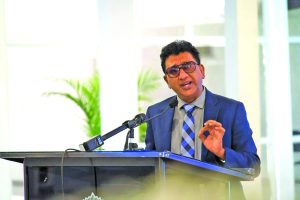Building Guyana’s restorative justice system priority – AG
- Home
- News

As part of the Government’s agenda for the modernisation of Guyana’s legal framework, the concept of restorative justice is gradually taking centre stage.
This point was made by Attorney General and Legal Affairs Minister Anil Nandlall, who contends that building the country’s restorative justice system is a major priority for the Government of Guyana.
On Monday, the first cohort of persons began training to become practitioners with responsibilities similar to those of probation officers but with an expanded focus on resolving issues outside of court and obtaining compensation for victims.

Attorney General and Legal Affairs Minister Anil Nandlall addressing the gathering at the Guyana Police Force Officers’ Mess Hall, Eve Leary (DPI photo)
The training held in collaboration with the Attorney General’s Chambers and Canada-Caricom Expert Deployment Mechanism will last for the next two weeks, and the 25 participants will be trained to effectively engage victims, offenders and community leaders for a more holistic approach to addressing crime.
Upon completion of the programme, the practitioners will receive certificates that qualify them to implement the doctrine in their communities and social environs.
During his remarks to the gathering, the Attorney General explained that restorative justice was now part of Guyana’s justice institution, legal and social sector.
On this point, he disclosed that the system will help to reduce the heavy workload of magistrates across the country, and indicated that more persons would be trained.
“We have trained all the Toshaos, this current set and many others before. In almost all the regions or most of the regions, we have trained the Religious Leaders and other persons considered influential and leadership material…We continue to train people, even if you are incorporated formally in the system or not, your knowledge of restorative justice will serve you well in your community,” the Attorney General said.

Attorney General and Legal Affairs Minister Nandlall, along with acting Chancellor of the Judiciary, Yonette Cummings, Head of Cooperation at the Canadian High Commission in Georgetown, Adam Loyer and participants on Monday
This aspect of expanding the restorative justice programme is expected to also reduce prison overpopulation, and provide support to victims and justice in communities where there are no courtrooms, hence reducing recidivism.
In this regard, Nandlall added that Government would also be incorporating restorative justice systems into the Hope and Justice Centres being build-out across the country.
“I have discussed with my colleague Minister, Dr Vindhya Persaud and we have agreed to use the probation department across the country and to install in the probation departments across a restorative justice component, either one or two officers…We already have historically a relationship between the administration of justice, the Judiciary, and the magistracy… we are going to capitalise on that relationship,” the minister said.
Restorative justice is a system of providing justice to persons through consultation between a victim, perpetrator and community member without imprisonment for non-violent crimes.
Restorative justice is an alternative approach that seeks to repair harm by providing opportunities for the victim and perpetrator to discuss and address their needs in the aftermath, in a way that promotes healing, accountability, and understanding.
The method falls under the Inter-American Development Bank (IDB)-funded Support for the Criminal Justice System Programme, which is aimed at addressing the overcrowding in prisons by focusing on two aspects: the overuse of pre-trial detention, and the overreliance by the criminal justice system on custodial sentences. (G1)
https://guyanatimesgy.com/building-guyanas-restorative-justice-system-priority-ag/